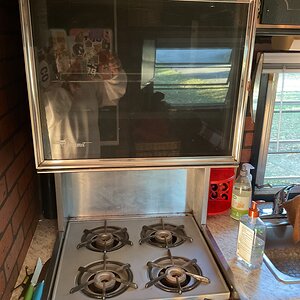Navigation
Install the app
How to install the app on iOS
Follow along with the video below to see how to install our site as a web app on your home screen.
Note: This feature may not be available in some browsers.
More options
Welcome to RVForums.com
- Register now and join the discussion
- Friendliest RV Community on the web
- Modern site for PC's, Phones, Tablets - no 3rd party apps required
- Ask questions, help others, review campgrounds
- Get the most out of the RV Lifestyle
- Invite everyone to RVForums.com and let's have fun
- Commercial/Vendors welcome
You are using an out of date browser. It may not display this or other websites correctly.
You should upgrade or use an alternative browser.
You should upgrade or use an alternative browser.
Nitrogen in tires
- Thread starter old timer
- Start date
old timer
RVF Supporter
- Joined
- Nov 26, 2023
- Messages
- 145
- Location
- Angola Indiana
- RV Year
- 2017
- RV Make
- Forest River
- RV Model
- Gray Wolf
- RV Length
- 17
- Fulltimer
- No
I apologize for any argument on this matter, I was only asking a answer for I thought was a simple question.
BTW thanks everyone who spent time to comment and post their findings.
I purchased new tires from the advice that the tires were probably seven years old, although one out of four went flat sitting in the driveway. lol
lol
BTW thanks everyone who spent time to comment and post their findings.
I purchased new tires from the advice that the tires were probably seven years old, although one out of four went flat sitting in the driveway.
- Joined
- Dec 10, 2022
- Messages
- 150
- RV Year
- 1990
- RV Make
- Barth
- RV Model
- Regency
- RV Length
- 38
- Chassis
- Gillig
- Engine
- 3208 Caterpillar
- TOW/TOAD
- Honda
- Fulltimer
- No
Nitrogen test update results on my rig with 22.5 tires:
*Inside dual has air.
*Outside dual has nitrogen. All the pressure was removed and filled again with nitrogen from my nitrogen tank for the test.
*Both tires are 110 LBS at 70 degrees in my garage.
*Four hours on the highway the temperature increases, the pressure increases.
* Outside dual with higher temperature still has 5 LBS less pressure increase with nitrogen.
*122 LBS with nitrogen
*127 LBS with all air
Same test on my car with 15 inch tires. (Left and right sides because the wheels are not dual).
* There was only 1 or two LBS of difference with air compared to nitrogen.
As stated in this conversation, the biggest benefit is, nitrogen has no moisture.
From my results, on a hot day tire pressure using nitrogen is more stable with larger tires requiring higher pressures.
I find aluminum wheels leak around the metal valve stem because of the aluminum corroding.
*Inside dual has air.
*Outside dual has nitrogen. All the pressure was removed and filled again with nitrogen from my nitrogen tank for the test.
*Both tires are 110 LBS at 70 degrees in my garage.
*Four hours on the highway the temperature increases, the pressure increases.
* Outside dual with higher temperature still has 5 LBS less pressure increase with nitrogen.
*122 LBS with nitrogen
*127 LBS with all air
Same test on my car with 15 inch tires. (Left and right sides because the wheels are not dual).
* There was only 1 or two LBS of difference with air compared to nitrogen.
As stated in this conversation, the biggest benefit is, nitrogen has no moisture.
From my results, on a hot day tire pressure using nitrogen is more stable with larger tires requiring higher pressures.
I find aluminum wheels leak around the metal valve stem because of the aluminum corroding.
team bradfield
RVF Expert
- Joined
- Nov 9, 2022
- Messages
- 600
- RV Year
- 2023
- RV Make
- Newmar
- RV Model
- Dutch Star 4081
- RV Length
- 40'-10"
- Chassis
- Sparten
- Engine
- 450 cummins
- TOW/TOAD
- 2022 Grand Cherokee
- Fulltimer
- No
Chargerman
RVF VIP
- Joined
- Dec 26, 2019
- Messages
- 340
old timer
RVF Supporter
- Joined
- Nov 26, 2023
- Messages
- 145
- Location
- Angola Indiana
- RV Year
- 2017
- RV Make
- Forest River
- RV Model
- Gray Wolf
- RV Length
- 17
- Fulltimer
- No
Similar threads
- Replies
- 0
- Views
- 278
- Replies
- 15
- Views
- 2K
Latest resources
-
-
Trueline Leveling System (Valid Air)Operation & Service Manuals for the Valid Air leveling system
- Jim
- Updated:
-
-
Notes on the Electrical Systems of the Roadtrek Zion Family of RVsNotes on the Electrical Systems of the Roadtrek Zion Family of RVs
- dilbertjth
- Updated:
-












